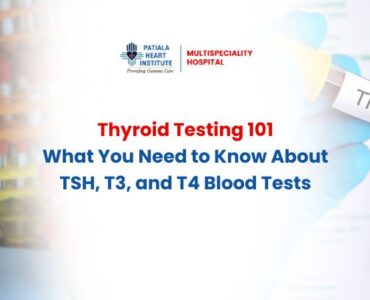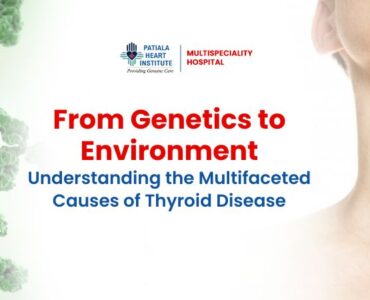Thyroid disorders are a significant health concern, particularly among women. The thyroid gland, a small but powerful gland at the base of the neck, plays a crucial role in regulating many of the body’s vital functions. When the thyroid doesn’t function properly, it can lead to various health issues that impact physical, emotional, and mental well-being.
Thyroid disorders are particularly prevalent in women, who are five to eight times more likely than men to develop these conditions. This higher prevalence is due to genetic, hormonal, and autoimmune factors. Women are especially vulnerable to thyroid disorders during hormonal changes, such as puberty, pregnancy, and menopause. For instance, postpartum thyroiditis can occur after childbirth, while the risk of developing hypothyroidism increases with age, particularly after menopause.
The high prevalence of thyroid disorders in women underscores the need for increased awareness, routine screening, and targeted interventions to address this critical aspect of women’s health. Early diagnosis and treatment are important to avoid the long-term consequences of thyroid imbalances and support women’s overall well-being at different stages of their lives.
Types of Thyroid Disorders
Thyroid disorders encompass various conditions that affect the thyroid gland, each with distinct causes, symptoms, and treatment options. Understanding these disorders is crucial for effective management and improved quality of life.
Hypothyroidism
Hypothyroidism, or underactive thyroid, occurs when the thyroid gland produces insufficient thyroid hormones. This condition slows the body’s metabolism, leading to various health issues.
Common Causes of Thyroid in Females:
- Hashimoto’s Thyroiditis: It is an autoimmune disorder in which the immune system attacks the thyroid gland, leading to chronic inflammation and impaired hormone production.
- Iodine Deficiency: Iodine is necessary for the production of thyroid hormone. A deficiency can lead to hypothyroidism.
- Thyroid Surgery: Partial or total thyroid gland removal can reduce hormone production.
- Radiation Therapy: This treatment for head and neck cancers can damage the thyroid gland, causing hypothyroidism.
Hyperthyroidism
Hyperthyroidism occurs when the thyroid gland produces large amounts of thyroid hormones, speeding up the body’s metabolism.
Common Causes of Thyroid in Females:
- Graves’ Disease: An autoimmune disorder that stimulates the thyroid to produce too much hormone.
- Toxic Adenoma: A benign tumor on the thyroid gland that secretes excess hormones.
- Multinodular Goiter: Multiple nodules on the thyroid that produce excess hormones.
- Thyroiditis: Inflammation of the thyroid gland causes hormone leakage and temporary hyperthyroidism.
Thyroid Nodules and Goiter
- Thyroid Nodules: They are kind of lumps formed within the thyroid gland. They can be solid or fluid-filled and are often benign but can sometimes be cancerous.
- Goiter: An enlargement of the thyroid gland can occur with both hypothyroidism and hyperthyroidism.
Common Causes of Thyroid in Females:
- Iodine Deficiency: A diet lacking iodine can lead to thyroid enlargement.
- Hashimoto’s Thyroiditis: Chronic inflammation can cause the thyroid to enlarge.
- Graves’ Disease: Overstimulation of the thyroid can lead to goiter.
- Thyroid Cancer: Although less common, cancer can cause the thyroid to enlarge.
Hormonal Influences on Thyroid Function
The thyroid gland, an important component of the endocrine system, is profoundly influenced by various hormones, particularly those that fluctuate during different stages of a woman’s life. Estrogen and progesterone, along with other hormonal changes during pregnancy and menopause, play significant roles in thyroid function. Understanding these influences is essential for managing thyroid health effectively.
Estrogen and Progesterone
The menstrual cycle involves regular fluctuations in estrogen and progesterone levels, which can affect thyroid function in several ways:
- Estrogen Influence: Estrogen can increase thyroid-binding globulin (TBG) levels, a protein that binds thyroid hormones and reduces the amount of free (active) hormones available in the bloodstream. When estrogen levels are high, this can cause a temporary state of hypothyroidism during phases of the menstrual cycle.
- Progesterone Influence: Progesterone, on the other hand, tends to have a stabilizing effect on thyroid function. However, imbalances between estrogen and progesterone can contribute to thyroid dysfunction.
- Menstrual Symptoms: Women with thyroid disorders often report more severe premenstrual syndrome (PMS) symptoms, including mood swings, fatigue, and changes in menstrual flow, highlighting the intricate link between thyroid and reproductive hormones.
Effects of Hormonal Contraception
Hormonal contraception, including birth control pills, patches, and intrauterine devices (IUDs) that release hormones, can also impact thyroid function:
- Increased TBG Levels: Similar to natural estrogen, the synthetic estrogen in hormonal contraceptives can raise TBG levels, potentially altering thyroid hormone availability and necessitating adjustments in thyroid medication dosages.
- Hormone Stability: Some women may experience more stable thyroid function due to the consistent hormone levels provided by contraception, whereas others might notice changes in their thyroid symptoms.
Pregnancy
Pregnancy induces significant hormonal changes that affect thyroid function:
- Increased Demand: The body requires more thyroid hormones during pregnancy to help the growing fetus and placenta. The thyroid gland often enlarges slightly to meet this increased demand.
- Human Chorionic Gonadotropin (hCG): This hormone, produced during pregnancy, has a thyrotropic effect, meaning it can mildly stimulate the thyroid to produce more hormones, particularly in the first trimester.
- Increased TBG: Elevated estrogen levels during pregnancy increase TBG, leading to higher total thyroid hormone levels but potentially lower free hormone levels.
Menopause
Menopause brings about a specific decline in estrogen and progesterone levels, which can affect thyroid function in various ways:
- Decreased Estrogen: Lower estrogen levels post-menopause result in reduced TBG levels, potentially increasing free thyroid hormone levels and altering thyroid function.
- Symptom Overlap: Menopausal symptoms such as fatigue, mood changes, and weight gain overlap with thyroid dysfunction symptoms, making it essential to differentiate between the two.
- Bone Health: Both thyroid dysfunction and menopause can negatively impact bone density, increasing the risk of osteoporosis.
Treatment Considerations
Hypothyroidism Treatment
- Levothyroxine Therapy: It is a synthetic form of the thyroid hormone T4. It is the standard treatment for hypothyroidism.
- Dosage: It is determined based on the patient’s weight, age, severity of hypothyroidism, and other health conditions.
- Monitoring: Regular blood tests to monitor TSH and free T4 levels, ensuring the correct dosage.
- Special Considerations During Pregnancy: Pregnant women with hypothyroidism require closer monitoring and often increased doses of levothyroxine to maintain optimal thyroid hormone levels for fetal development.
Hyperthyroidism Treatment
- Antithyroid Medications: Medications like methimazole and propylthiouracil (PTU) reduce thyroid hormone production.
- Methimazole: Preferred due to fewer side effects.
- Propylthiouracil (PTU): Used in the first trimester of pregnancy and in patients who cannot tolerate methimazole.
- Radioactive Iodine Therapy: Radioactive iodine is ingested and absorbed by the thyroid gland, destroying overactive thyroid cells and reducing hormone production. This is a common and effective treatment for hyperthyroidism.
- Surgical Options (Thyroidectomy): Surgical thyroid gland removal (partial or total) is considered when medications and radioactive iodine therapy are unsuitable or ineffective. Surgery is also an option for patients with large goiters causing compressive symptoms or those with thyroid cancer.
Management of Thyroid Nodules and Goiter
- Observation and Regular Monitoring: Small, benign nodules and non-symptomatic goiters may be monitored with reguar ultrasounds and thyroid function tests to ensure they do not grow or cause problems.
- Fine-needle Aspiration Biopsy: This minimally invasive procedure uses a thin needle to extract cells from a thyroid nodule for microscopic examination, determining whether the nodule is benign or malignant.
- Surgical Intervention, if Necessary: Surgery may be recommended for nodules that are suspicious of cancer, symptomatic goiters, or nodules causing compressive symptoms.
Conclusion
If you are experiencing symptoms such as a swollen thyroid, fatigue, unexplained weight changes, or any other signs of thyroid dysfunction, it is essential to seek expert medical advice. At Patiala Heart Institute, we have a team of dedicated thyroid specialists and ENT doctors in Patiala who can provide comprehensive care and personalized treatment plans to address your thyroid health needs.
Whether you need a thorough evaluation, ongoing management, or surgical intervention, our ENT specialists in Patiala are here to help.
Contact Patiala Heart Institute for more information or to book an appointment with our thyroid specialist. Let us help you learn how to control thyroid in females and have a better quality of life.






